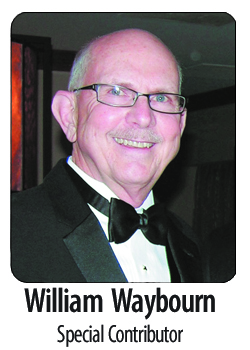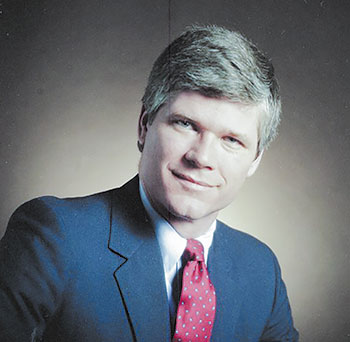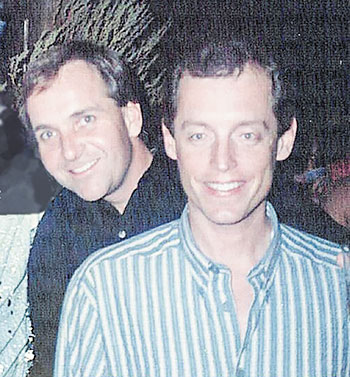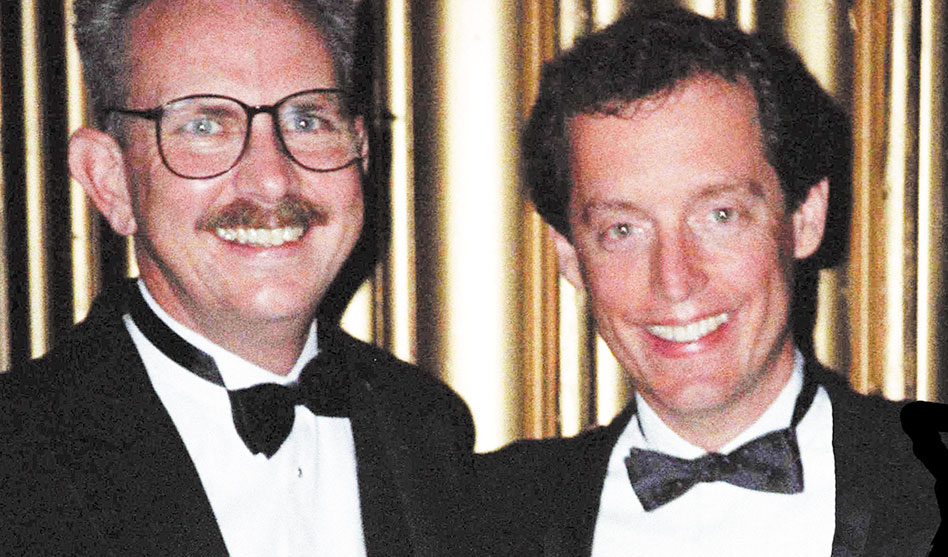William Waybourn and Mike Anglin in 1986
Remembering the early days of Black Tie
 With the death of Dick Weaver in November 2022, Mike Anglin and I are now the last remaining original founders of the Dallas Black Tie Dinner, created in 1982. With enormous pride, we celebrate the overwhelming success of an event that has served, united and benefitted the Dallas LGBTQ community for these past 42 years.
With the death of Dick Weaver in November 2022, Mike Anglin and I are now the last remaining original founders of the Dallas Black Tie Dinner, created in 1982. With enormous pride, we celebrate the overwhelming success of an event that has served, united and benefitted the Dallas LGBTQ community for these past 42 years.
The weekly “dinner” planning sessions of that early era of the dinner were conducted in John Thomas’s living room near North Central Expressway. Our meetings were held every Saturday morning, regardless of weather or other circumstances. You didn’t miss the meetings; after a few minutes of sharing lives, we got down to business.
At the end of our planning sessions, John would hand out specific assignments to each committee member as we worked toward our common goal of creating a large, memorable event for the community. Expenses were kept to a minimum, the largest being the meal itself. So cofounder Ray Kuchling carefully negotiated the menus with the hosting hotels. Volunteers gave their time and expertise; each board member was required to buy tickets, and/or sell them through table captains.

Dick Weaver
John was a natural leader. He laid the groundwork for the dinner’s structure. The dinner event would be “owned and controlled” locally in Dallas. Hopefully, it would generate a net profit from ticket sales, and that profit in 1982 was donated to the Human Rights Campaign Fund in Washington, D.C. (now known as HRC).
The second dinner also generated a profit, but that year the profits were split between HRC and the Federation of AIDS-Related Organizations. In 1984, the Dallas-based Foundation for Human Understanding (now known as Resource Center) also received a share of the profits. In 1985, it was decided that a third of the ticket sales would go toward the costs of the event, one-third to HRC and the final third would be split with FHU, the Metropolitan Community Church, Oak Lawn Counseling Services, the Texas Human Rights Foundation and the Turtle Creek Chorale.
Thereafter, the list of local, tax-exempt beneficiaries slowly grew. These beneficiary organizations also turned to their own donors and supporters for participation, greatly increasing our ticket sales.
Never did we anticipate what the dinner would eventually become. Even during the worst of times — AIDS — it never failed to give our community an evening to dress up, step out and be reminded how much we had in common.
The first dinner had as many attendees from the nascent Turtle Creek Chorale performance as it had seated at tables. Ironically, the guest speakers were almost an afterthought, as table-hopping and visiting with friends — and later bidding in the silent auctions — were paramount. You didn’t leave to go to the restroom but to check on the latest bids.

John Thomas
When we traveled across the U.S., we began to notice how the reputation of the Dallas Black Tie Dinner was steadily growing and how other cities were trying to model their own fundraising dinners on the Dallas model to draw first hundreds, then thousands, to a single night of celebration and remembrance.
Since the dinners in the 1980s and ’90s took place amidst the AIDS crisis, we all knew individuals who didn’t survive from one dinner to the next, and it was with great sadness that we recognized their passing.
There was also much humor: One Saturday morning, we arrived to find John’s apartment filled with smoke. Volunteer Mike Hearn had put a brie cheese in the oven to bake while John was in the shower, unaware that it was burning.
So Mike and I are the last two surviving cofounders, and I think he and I have a unique perspective of the dinner’s many years of success. And great pride in it. There is still no equal to the Dallas dinner today.
Its ultimate success rests not on the founding board, except for its initiative to invent something new for the community and “pull it off” successfully. No, the success today relies on the legions of volunteers (and yes, committed board members) who tirelessly serve without pay or benefit of recognition.

Ray Kuchling and Mike Anglin in 1983
If there is one underlying commonality among the many people involved in the dinners over the years, it is their amazing ability to work together with colleagues, all cooperating in a great undertaking to improve things for the many branches of the LGBT community.


Thank you for this history and remembrance of the amazing queer community in Dallas, and thank you for your dedication and vision in building Black Tie Dinner and the community.